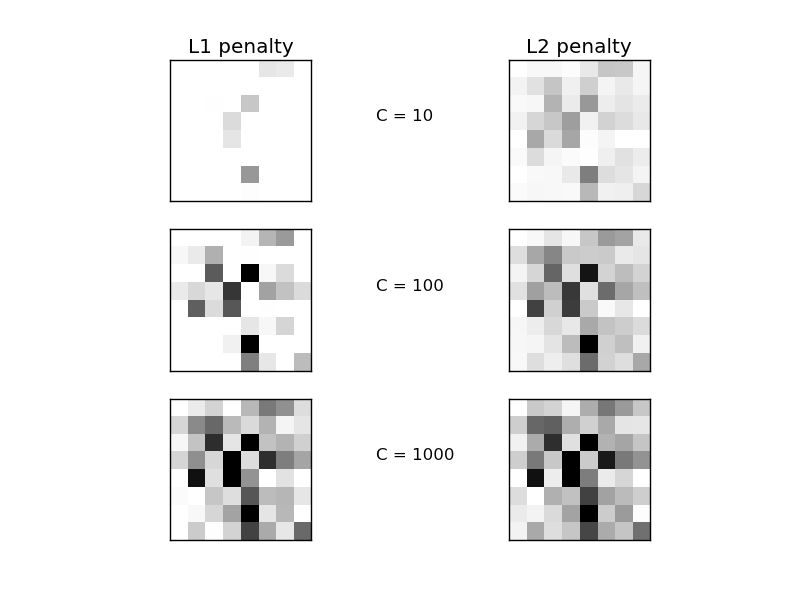L1 Penalty and Sparsity in Logistic Regression¶
Comparison of the sparsity (percentage of zero coefficients) of solutions when L1 and L2 penalty are used for different values of C. We can see that large values of C give more freedom to the model. Conversely, smaller values of C constrain the model more. In the L1 penalty case, this leads to sparser solutions.
We classify 8x8 images of digits into two classes: 0-4 against 5-9. The visualization shows coefficients of the models for varying C.

Script output:
C=10.000000
Sparsity with L1 penalty: 87.500000
score with L1 penalty: 0.797440
Sparsity with L2 penalty: 4.687500
score with L2 penalty: 0.885364
C=100.000000
Sparsity with L1 penalty: 53.125000
score with L1 penalty: 0.895938
Sparsity with L2 penalty: 4.687500
score with L2 penalty: 0.907067
C=1000.000000
Sparsity with L1 penalty: 12.500000
score with L1 penalty: 0.910406
Sparsity with L2 penalty: 4.687500
score with L2 penalty: 0.909850
Python source code: plot_logistic_l1_l2_sparsity.py
print __doc__
# Authors: Alexandre Gramfort <alexandre.gramfort@inria.fr>
# Mathieu Blondel <mathieu@mblondel.org>
# Andreas Mueller <amueller@ais.uni-bonn.de>
# License: BSD Style.
import numpy as np
import pylab as pl
from sklearn.linear_model import LogisticRegression
from sklearn import datasets
from sklearn.preprocessing import Scaler
digits = datasets.load_digits()
X, y = digits.data, digits.target
X = Scaler().fit_transform(X)
# classify small against large digits
y = (y > 4).astype(np.int)
# Set regularization parameter
for i, C in enumerate(10. ** np.arange(1, 4)):
# turn down tolerance for short training time
clf_l1_LR = LogisticRegression(C=C, penalty='l1', tol=0.01)
clf_l2_LR = LogisticRegression(C=C, penalty='l2', tol=0.01)
clf_l1_LR.fit(X, y)
clf_l2_LR.fit(X, y)
coef_l1_LR = clf_l1_LR.coef_.ravel()
coef_l2_LR = clf_l2_LR.coef_.ravel()
# coef_l1_LR contains zeros due to the
# L1 sparsity inducing norm
sparsity_l1_LR = np.mean(coef_l1_LR == 0) * 100
sparsity_l2_LR = np.mean(coef_l2_LR == 0) * 100
print "C=%f" % C
print "Sparsity with L1 penalty: %f" % sparsity_l1_LR
print "score with L1 penalty: %f" % clf_l1_LR.score(X, y)
print "Sparsity with L2 penalty: %f" % sparsity_l2_LR
print "score with L2 penalty: %f" % clf_l2_LR.score(X, y)
l1_plot = pl.subplot(3, 2, 2 * i + 1)
l2_plot = pl.subplot(3, 2, 2 * (i + 1))
if i == 0:
l1_plot.set_title("L1 penalty")
l2_plot.set_title("L2 penalty")
l1_plot.imshow(np.abs(coef_l1_LR.reshape(8, 8)), interpolation='nearest',
cmap='binary', vmax=1, vmin=0)
l2_plot.imshow(np.abs(coef_l2_LR.reshape(8, 8)), interpolation='nearest',
cmap='binary', vmax=1, vmin=0)
pl.text(-8, 3, "C = %d" % C)
l1_plot.set_xticks(())
l1_plot.set_yticks(())
l2_plot.set_xticks(())
l2_plot.set_yticks(())
pl.show()
